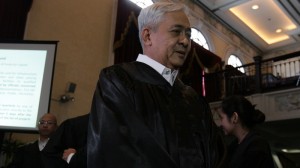MANILA, Philippines–Despite efforts by Solicitor General Francis Jardeleza to stop Monday’s vote on the final nominees for the last seat on the Supreme Court (SC), the Judicial and Bar Council (JBC) pushed through with the voting and picked four of the 13 nominees.
Jardeleza was not one of them.
The four nominees for the position of Supreme Court associate justice whose names will be submitted to President Aquino for consideration are: Court of Appeals Associate Justices Apolinario Bruselas and Jose Reyes Jr., who received six votes each; and Commission on Audit Chair Grace Pulido-Tan and Quezon City Regional Trial Court Judge Reynaldo Daway, who got four votes each.
Supreme Court spokesman Theodore Te said there were actually five nominees who made it to the JBC short list after they garnered a majority of the votes.
But Te said one nominee could not be included in the short list “because of an invocation of Rule 10, Section 2, of the JBC’s rules.”
He declined to name who had invoked the JBC provision against the nominee.
The nominee Te was obviously referring to was Jardeleza, who had asked the Supreme Court and the JBC to defer Monday voting so he could defend himself against objections to his integrity as a nominee that were raised by Chief Justice Ma. Lourdes Sereno.
Four votes
Jardeleza reportedly garnered four votes from the JBC. The JBC has seven members but only six voted, in the absence of a replacement for Regino Hermosisima who had left the JBC on July 9, 2009, after serving three terms.
The six JBC members who voted were Sereno, Justice Secretary Leila de Lima, Iloilo Rep. Niel Tupas Jr. (all three being ex officio members), Aurora Lagman, Jose Mejia and Ma. Milagros Fernan-Cayosa.
Jardeleza asked the high court last week not only to defer Monday’s vote but to also bar Sereno from taking part in the voting after she had denied him his right to due process when she challenged his integrity as a nominee and invoked Rule 10, Section 2, of the JBC rules.
Under that provision, “when the integrity of an applicant who is not otherwise disqualified for nomination is raised or challenged, the affirmative vote of all the members of the Council must be obtained for the favorable consideration of his nomination.”
Leading nominee
Before the vote, Jardeleza, a leading nominee, had appeared before the council to ask that it defer Monday’s voting so the full court could meet on it in Tuesday’s en banc session.
After his appearance at the JBC, Jardeleza confirmed to reporters that the one who objected to his nomination was Sereno.
“She is my accuser… and so it’s very simple, an accuser cannot be a judge,” Jardeleza said.
He said Sereno had told him to respond to the charges she had against him but he declined because he wanted the Chief Justice to put them in writing and under oath in accordance with the JBC rules.
Jardeleza said he left the meeting with the hope the vote would not push through because, otherwise, the JBC would be preempting the Supreme Court due to his pending petition.
The Solicitor General denied he had personal differences with Sereno since the time they were faculty members at the University of the Philippines College of Law.
He said there was a big issue at the UP College of Law when he was a lecturer there three years ago. He said he supported then incumbent UP law dean Danny Concepcion and spoke out against law teachers “who do not attend classes, who do not correct papers or do not finish the course or syllabus.”
“Chief Justice Sereno has left the college but I do not know if [she is holding a grudge against me because of that]. But the people at the college know me,” he said.
